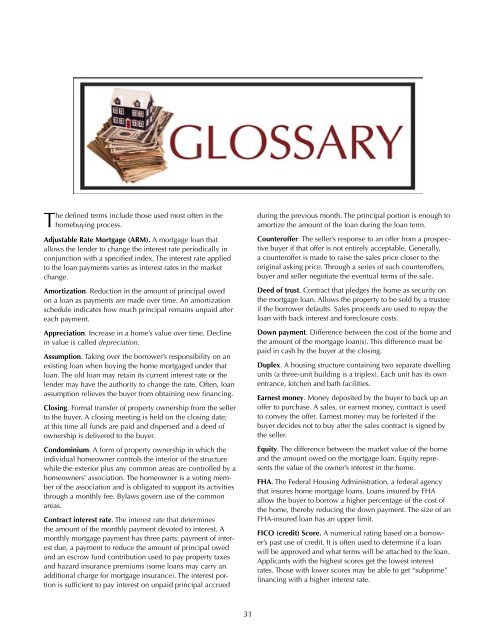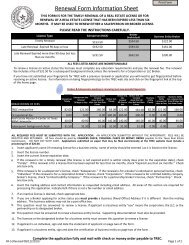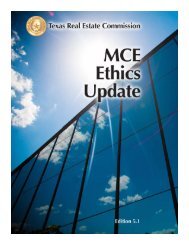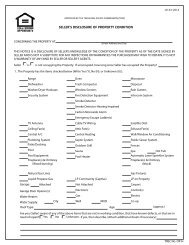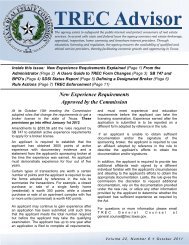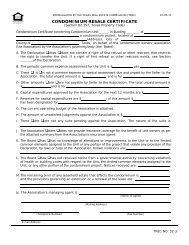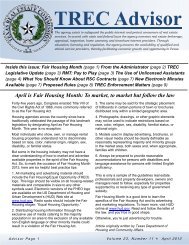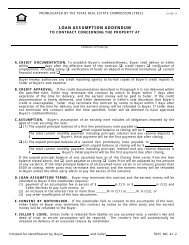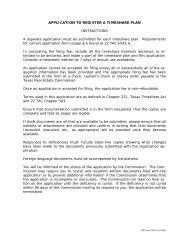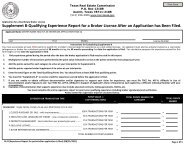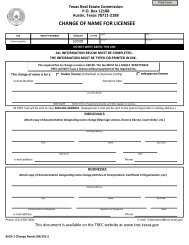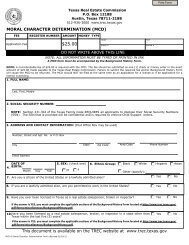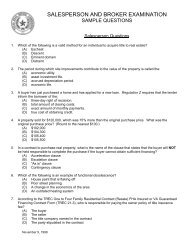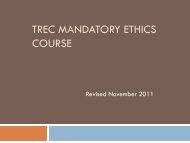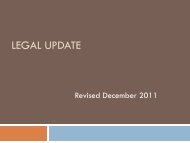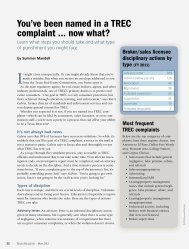Homebuyer's Guide - Real Estate Center - Texas A&M University
Homebuyer's Guide - Real Estate Center - Texas A&M University
Homebuyer's Guide - Real Estate Center - Texas A&M University
You also want an ePaper? Increase the reach of your titles
YUMPU automatically turns print PDFs into web optimized ePapers that Google loves.
The defined terms include those used most often in the<br />
homebuying process.<br />
Adjustable Rate Mortgage (ARM). A mortgage loan that<br />
allows the lender to change the interest rate periodically in<br />
conjunction with a specified index. The interest rate applied<br />
to the loan payments varies as interest rates in the market<br />
change.<br />
Amortization. Reduction in the amount of principal owed<br />
on a loan as payments are made over time. An amortization<br />
schedule indicates how much principal remains unpaid after<br />
each payment.<br />
Appreciation. Increase in a home’s value over time. Decline<br />
in value is called depreciation.<br />
Assumption. Taking over the borrower’s responsibility on an<br />
existing loan when buying the home mortgaged under that<br />
loan. The old loan may retain its current interest rate or the<br />
lender may have the authority to change the rate. Often, loan<br />
assumption relieves the buyer from obtaining new financing.<br />
Closing. Formal transfer of property ownership from the seller<br />
to the buyer. A closing meeting is held on the closing date;<br />
at this time all funds are paid and dispersed and a deed of<br />
ownership is delivered to the buyer.<br />
Condominium. A form of property ownership in which the<br />
individual homeowner controls the interior of the structure<br />
while the exterior plus any common areas are controlled by a<br />
homeowners’ association. The homeowner is a voting member<br />
of the association and is obligated to support its activities<br />
through a monthly fee. Bylaws govern use of the common<br />
areas.<br />
Contract interest rate. The interest rate that determines<br />
the amount of the monthly payment devoted to interest. A<br />
monthly mortgage payment has three parts: payment of interest<br />
due, a payment to reduce the amount of principal owed<br />
and an escrow fund contribution used to pay property taxes<br />
and hazard insurance premiums (some loans may carry an<br />
additional charge for mortgage insurance). The interest portion<br />
is sufficient to pay interest on unpaid principal accrued<br />
during the previous month. The principal portion is enough to<br />
amortize the amount of the loan during the loan term.<br />
Counteroffer. The seller’s response to an offer from a prospective<br />
buyer if that offer is not entirely acceptable. Generally,<br />
a counteroffer is made to raise the sales price closer to the<br />
original asking price. Through a series of such counteroffers,<br />
buyer and seller negotiate the eventual terms of the sale.<br />
Deed of trust. Contract that pledges the home as security on<br />
the mortgage loan. Allows the property to be sold by a trustee<br />
if the borrower defaults. Sales proceeds are used to repay the<br />
loan with back interest and foreclosure costs.<br />
Down payment. Difference between the cost of the home and<br />
the amount of the mortgage loan(s). This difference must be<br />
paid in cash by the buyer at the closing.<br />
Duplex. A housing structure containing two separate dwelling<br />
units (a three-unit building is a triplex). Each unit has its own<br />
entrance, kitchen and bath facilities.<br />
Earnest money. Money deposited by the buyer to back up an<br />
offer to purchase. A sales, or earnest money, contract is used<br />
to convey the offer. Earnest money may be forfeited if the<br />
buyer decides not to buy after the sales contract is signed by<br />
the seller.<br />
Equity. The difference between the market value of the home<br />
and the amount owed on the mortgage loan. Equity represents<br />
the value of the owner’s interest in the home.<br />
FHA. The Federal Housing Administration, a federal agency<br />
that insures home mortgage loans. Loans insured by FHA<br />
allow the buyer to borrow a higher percentage of the cost of<br />
the home, thereby reducing the down payment. The size of an<br />
FHA-insured loan has an upper limit.<br />
FICO (credit) Score. A numerical rating based on a borrower’s<br />
past use of credit. It is often used to determine if a loan<br />
will be approved and what terms will be attached to the loan.<br />
Applicants with the highest scores get the lowest interest<br />
rates. Those with lower scores may be able to get “subprime”<br />
financing with a higher interest rate.<br />
31


